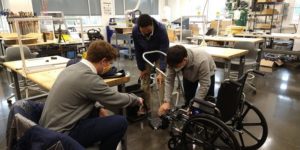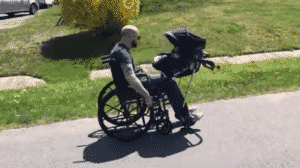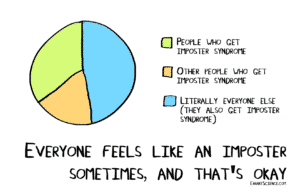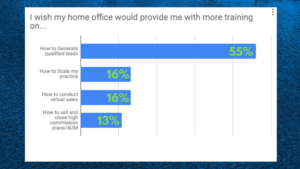

“The difference between winning and losing is most often…not quitting.”
The First Sip

Hey Sunday Brewers!
We’ve got imposters, challenges, brand new survey data, and a quick digest of this week’s headlines.
But first, let me restore your hope in humanity with a story of kindness…
After having brain surgery three years ago, Jeremy King has had some lingering effects that keep him wheelchair bound for large periods of time.
And because he experiences significant balance issues, he’s unable to walk long distances.
So when he and his wife Chelsea welcomed their brand new baby boy into the world a few weeks back…
…they knew there would be certain limitations to what the young father could do.
One of the biggest concerns was that he wouldn’t be able to safely carry their son around or push a stroller on family walks.
But there were good things in store for the growing family.
Chelsea, a high school teacher, works at a school that has a collaborative program where students and teachers can use technology like 3D printers to focus on “empathy-driven” projects.
They call it “Making For Social Good.”
The goal of the class each semester is to select a person or organization that they can design or build something for.
And when they heard about Chelsea and her husband, the students immediately jumped into action.

Using 3D modeling software, the class tested two different solutions that they believed would help Jeremy be able to push his baby boy in a stroller while using his wheelchair.
And after plenty of testing, optimizing, and trial and error, they came up with the perfect solution.

Using a few basic supplies and custom printed parts, the car seat can now attach directly to the wheelchair.
It gives Jeremy the chance to be a dad.
As Chelsea explains, “It has given us the ability to do something simple like take a walk as a family; something that a lot of families don’t have to think twice about.”
1 Caffeinated Neurohack

Do you ever feel a wave of self-doubt sweep over you right before a big meeting, presentation, or call?
Do you ever feel like you don’t know as much as you believe others think you should know?
If so, you’ve suffered from imposter syndrome.
Common symptoms include:
👎 Feeling like a fraud
👎 Devaluing your worth
👎 Undermining your expertise and experience
To be quite honest, anyone who is successful has experienced imposter syndrome at one point or another.
(In fact, it’s usually a sign that you’re doing something right.)
The problem is that, left alone, imposter syndrome can kill your confidence and prevent you from taking action.
If you let it, imposter syndrome will keep you from launching a podcast, hosting a webinar, calling a prospect, or offering advice to a client.
But you don’t have to let this invisible force win.
Here are some simple ways advisors shut imposter syndrome down and restore confidence in themselves:
👉 Make a list of 10 skills or factors that make you qualified to be where you are. (Read them before every call, presentation, etc.)
👉 Take a positive affirmation and add your name to it. (“I have lots of value to share” → “FNAME has lots of value to share.”) Repeat out loud multiple times per day.
👉 Embrace the fact that you won’t always have an answer. There’s always something more to learn. Be okay with telling people, “I’m not sure. Let me find the answer and get back with you!”
☕ TL;DR: Imposter syndrome is normal for advisors, but here are 3 ways to fight back.
Marketing Psychology Quick Hit

When people ask you what you do, what do you say?
Raise your hand if say:
🔲 Holistic advisor
🔲 Financial planner
🔲 Insurance advisor
🔲 Other generic term
That’s most of us, right?
But let me ask you a question:
If you’re just one of dozens of financial advisors in your market, what makes people want to work with you?
You really need a unique sales proposition, or USP.
More specifically, you need what marketers call a “unique mechanism.”
A unique mechanism is the system/product you use to deliver the results your clients need.
For example, rather than saying you help people save for retirement, a unique mechanism would be:
I use the F.A.S.T. Framework to help people save for a comfortable retirement without ruining their lifestyle in the present.
It doesn’t matter if you’re using the same approach as other advisors.
It’s all about the messaging.
By using a unique mechanism, you add and assign value to what you do.
In turn, people see you as more qualified and valuable.
My challenge to you this week:
Come up with a unique mechanism and to start using it in your LinkedIn profile, on your website, and in your email signature.
☕ TL;DR: Stop using generic terms and come up with a unique mechanism to set yourself apart from the competition.
Weekly Industry Catch-Up

As the U.S. tries to fight off the new COVID variant, markets seesaw back and forth…
Experts say Big Tech’s pandemic “boom” is over…
And Robinhood’s new stock surges 95% in less than 72 hours, then slowly retreats toward the end of the week…
Here’s what else happened:
🔹 In the red. U.S. household debt increased by $313 billion in Q2 to a total of nearly $15 trillion. That marks the highest peak since 2007.
Most of the gains are the result of a white-hot housing market and record-setting mortgage originations.
🔹 Crypto upgrades. Bitcoin’s “kid brother” Ethereum is growing up. The somewhat controversial “London” hard fork marks a major software upgrade that could make transactions faster and smoother. So far, rising prices indicate public confidence.
🔹 All smiles. According to a brand new study from the EBRI, there’s one common link that connects retirees who are happy, comfortable, and affluent in retirement. (Hint: It has to do with “making bank” after retiring.)
What’s New With SHIFT Nation
Find out why THIS ^^ matters at this week’s VAPH!
Ever wondered WHAT to say??? Join the group brainstorm here.
Enjoy your Sunday,
Jeremiah D. Desmarais
CEO, Advisorist
#1 in ROI-Driven Training for Advisors






